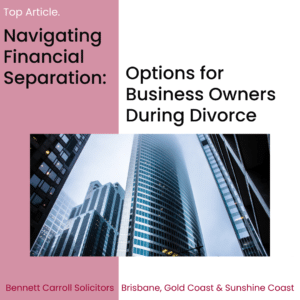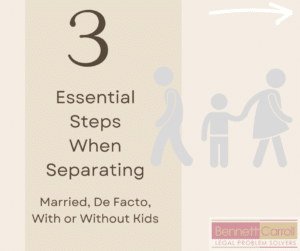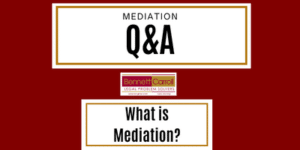If you are having business partnership problems, it’s best to sort out the issues early. Mediation can be a quick and cheap way to resolve the issues and to start the partnership on a better path. Bennett Carroll has nearly 40 years of successful mediation experience. Call us to discuss mediation.
What is mediation?
In mediation, the people in a dispute meet to sort out their issues. An impartial, trained mediator conducts the meeting. The mediator helps the parties discuss the issues, identifies solutions, and helps everyone work toward a mutually acceptable agreement.
Mediation is not a legal process.
The process is structured so that everyone has a turn to speak and to be heard.
Mediation is privileged – that means that anything said in mediation is confidential and cannot be used outside the mediation room.
Mediation is not appropriate if your issues are about criminal charges currently before the court.
Mediation can happen in the same room but can be done remotely. If you are in the same room, parties are allowed time out to discuss with their legal representatives, if they have them.
Usually only the parties, the mediator, and legal representatives attend.
If a party does not attend, the mediator will make a record. The matter might be resolved in their absence.
Prepare by asking your solicitor what s/he requires you to bring in the way of documentation; be familiar with that documentation.
How long does it take?
Mediation can take 2-3 hours or it can take a whole day. This depends upon the parties.
Mediation usually occurs on neutral ground in a central area of a city; for example in the Brisbane CBD. It can occur in a professional business room or a hotel or a solicitor’s office.
Mediation parties can attend remotely. Discuss this with your legal adviser.
Mediation is much quicker than court resolution. It can occur within six weeks—of course, this depends upon the availability of the parties and the mediator. Courts can take months to set a trial date.
Who uses / attends mediation?
Mediation works best when the parties can put aside their differences and are willing to meet. Obviously, if you and your partner are in a combative stage of the partnership, one of you might prefer to mediate remotely.
Mediation parties can number from two to as many as in the dispute – within reason of course. If it is a large partnership, then the person who has authority to settle the dispute is essential. The person who knows about the issues should also attend.
It is best to decide who will attend the mediation well in advance. This gives parties time to agree on who can attend (this can be an area of conflict). It is an issue that should be discussed with mediator and legal representatives.
A support person can attend the mediation but may not be allowed to sit in on the mediation; they can wait in a breakout room.
Mediation is voluntary; though some courts request that parties try mediation before commencing proceedings.
QCAT insists on mediation to settle disputes.
The most common disputes are:
- neighbor disputes about property boundaries especially fences, retaining walls; overhanging trees, noise, children, pets
- family and intergenerational disputes – wills, family law, children etc.
- workplace disputes
- commercial / business disputes
- property purchase/sale disputes
Who is the mediator?
The mediator is a trained professional; a member of the National Mediator Accreditation System. You can check of your mediator is a member of the Mediatory Standards Board here.
If this is a QCAT process, QCAT may supply a mediator. Otherwise, ask your solicitor – at Bennett Carroll we have mediators with whom we work and trust.
The mediator will guide you through the process and ensure that everyone has a turn to speak.
The mediator is neutral – they will not pass judgment.
The mediator does NOT give advice. They do not give legal advice. They facilitate the meeting to ensure that everyone has a say.
The mediator will help the parties draw up an agreement for their signatures.
If there is no final agreement, the mediator can help the parties draw up a list of issues still in dispute. This list will help with future action in the matter.
The mediator will keep the meeting’s records and provide a certificate at the end.
Call us on or email and safeguard your interests every step of the way- We are your legal problem solvers.









